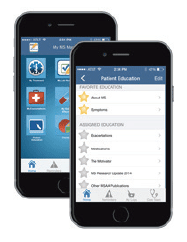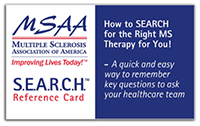By developing supportive tools and resources
Improving Lives Today…
By developing supportive tools and resources
< Back | Table Of Contents | Next >
When patients and their healthcare team are sharing information and working together rather than apart, the results of this teamwork can lead to great success. Known as “Shared Management,” this philosophy encourages members of the MS community to proactively manage their healthcare needs and overall wellness by researching information, tracking and reporting results, and developing direct and open communication with their neurologist and other treating specialists.

From a My MS Manager app user:
“Thanks for this, MSAA. This is a nice tool for tracking MS-related symptoms, medications, treatments, and so forth…I can see how this would be a good thing to bring with [me] to doctor visits because it can track lots of detailed info and might provide doctors with a level of detail you don’t normally bring. Plus, it’s free!” – Review received via the Apple store
Supported by MSAA, Shared Management is a learned skill involving education, training, use of technology, and “tools” to promote healthy outcomes. To support this effort, MSAA is continuing to develop a series of tools and resources to help members of the MS community take steps toward better health and an improved quality of life.
My MS Manager™: MSAA’s mobile phone application, My MS Manager, is provided free of charge to individuals with multiple sclerosis or their care partners to use on their iPhone, iPad, iPod touch, or Android mobile device. This first-of-its-kind app for MS allows individuals to track disease activity, store medical information, and generate charts and reports across various metrics such as treatments, moods, symptoms, and more. Other HIPAA-compliant features include optional private reminder settings, links to further educational materials from MSAA, and – exclusive to My MS Manager – the ability to connect to physicians and other clinicians on your care team via the app to share your progress and reports securely and as needed. Please visit mymsaa.org/mobile for more information.
“This information (on SEARCH) is concise and takes one through the information in an organized and intelligent way. Having MS is complicated and finding one’s way through all of this can seem insurmountable. I suspect this will be a very useful tool to the people who are willing to use it.”
MSAA’s S.E.A.R.C.H.™ Program: While having more than a dozen disease-modifying therapies (DMTs) available to treat MS is encouraging, the safety, effectiveness, and tolerability of any given medication varies considerably from one individual to another. Among the many questions people should ask their physician when considering a treatment option include:
- What are the therapies and am I a candidate?
- What should I know about each one?
- How will my body react to taking one of these medications?
- How are the different medications administered?
- What about the costs or insurance?
- Once I have begun taking a DMT, how do I know if the one I am prescribed is working?
Additionally, people with MS must recognize the need to prioritize their issues, questions, and concerns in order to maximize the time with their healthcare team. With so much information to remember, organize, and prioritize, MSAA recognizes the need to help frame these important discussions. By doing so, MSAA is able to support people with MS and their physicians in their SEARCH for the most appropriate therapy.
Designed as a memory aid, the SEARCH acronym represents the key areas that should be considered when “searching” for the most appropriate MS treatment. Each letter represents an important topic that must be considered by patients, physicians, and other healthcare and social service professionals. SEARCH stands for:
- Safety
- Effectiveness
- Access
- Risks
- Convenience
- Health Outcomes (overall wellness and quality of life)
MSAA has created a SEARCH “toolkit” with helpful written materials to assist with the program. The tools include:
- The SEARCH Program Overview booklet
- New, archived webinar, How to SEARCH for the Right MS Therapy for You!, and accompanying PowerPoint presentation
- The SEARCH Patient Workbook
- An MS Disease-Modifying Therapy Chart showing currently approved treatments
- An MS Resource Guide
- A laminated, wallet-sized reference card
These written materials may be downloaded at mymsaa.org/search. Individuals without internet access may request this same information by calling MSAA at (800) 532-7667.
My MS Resource Locator®: Given the complex and ever-changing nature of multiple sclerosis, people living with MS and their care partners often need access to a wide array of accurate, targeted information and reliable resources. Unfortunately, navigating the vastness of the internet to locate MS-specific information can be challenging and lead to frustration and poor health decisions. As a result, MSAA has created an MS-specific, online database known as My MS Resource Locator.
Offering information and support services, My MS Resource Locator is designed to make the search for MS-related information and resources as easy as possible. The site organizes content into 10, client-requested MS categories ranging from insurance to housing needs. It allows people to conduct zip code searches to identify local, regional, and national resources. Additionally, the site provides supportive companion guides to help visitors better understand and utilize the information. To access this specialized database, please visit resources.mymsaa.org.
MS Relapse Resource Center: Relapses, also referred to as exacerbations or attacks, are initially experienced by most people diagnosed with multiple sclerosis. When someone experiences a relapse, he or she may be having new symptoms or an increase in existing symptoms. To help the MS community better understand and effectively manage their relapses, MSAA created the MS Relapse Resource Center. This special section of MSAA’s website provides written and video content to help explain the onset and duration of a relapse, treatment options including various medications and rehabilitation approaches, and additional supportive tools to assist with the recognition and management of these attacks. To learn more about the MS Relapse Resource Center, please visit relapses.mymsaa.org.

